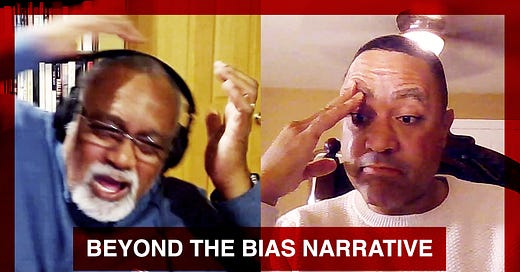This week, John and I continue our discussion of systemic racism, which was kicked off when one of my students wrote a searing critique of some of my positions. John and I agreed that “Simone” (not her real name) deserved a real, intellectually serious response. We can’t just blow off Simone and people like her—that is, sober-minded, sincere, intelligent progressives and leftists who happen to think that systemic racism is responsible for all or most of America’s racial disparities. In responding to their critiques, we hope to persuade them that there are more accurate ways to describe the situation. The first part of this attempt came by way of our conversation with Randy Kennedy. This is the second entry. In our next conversation, John and I hope to move from outlining the problems to proposing some solutions.
This conversation kicks off with the revelation that demand for John has outstripped supply—he simply doesn’t have time to talk about his book Woke Racism on podcasts anymore. We then set the table a bit and outline our broad critique of theories of systemic racism. We talk about whether it still makes sense to attribute racial disparities to black people’s status as victims of perpetual injustice. Are we really victims? Or has that story gotten old? We then move on the racial wealth gap, where we debunk claims about redlining and discuss why comparing the median incomes of whites and blacks makes no sense if you want to see what’s important about wealth disparities. We then move on to a slightly trickier subject: crack and powder cocaine sentencing disparities and incarceration. This is an area where I really do think there’s probably something to accusations of systemic racism, though that is not the only issue at play. John wants to know whether academic historical analyses of systemic racism can offer any counsel to ordinary people today. We end the discussion proper on the question of a racist white backlash against the excesses of woke politics.
I think many of you will find this one quite satisfying. I’m interested to hear what you think!
This post is free and available to the public. To receive early access to TGS episodes, an ad-free podcast feed, Q&As, and other exclusive content and benefits, click below.
0:00 John takes a step back from podcasting
3:29 Confronting the critique of systemic racism
14:18 The persistence of victimhood
19:36 Accounting for the racial wealth gap
31:50 Glenn: When it comes to incarceration, we have to take systemic racism seriously
46:29 Can analyses of historical systemic racism offer us counsel today?
51:52 John: Certain members of "the Elect" would be pleased to see an alt-right backlash
Links and Readings
Matthew Desmond’s piece on plantation slavery from the 1619 Project
Michael Fortner’s book, The Black Silent Majority: The Rockefeller Drug Laws and the Politics of Punishment
James Forman, Jr.’s book, Locking Up Our Own: Crime and Punishment in Black America















Share this post